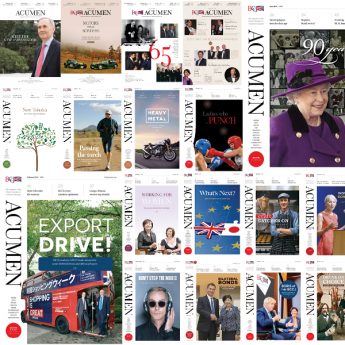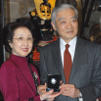Unilever launches first new hair product in a decade
Fifty years ago, a businessman named Mitsuo Hirano made what was a bold decision at the time in Japan: to establish an affiliate of a major foreign multinational.
Were Hirano to see Unilever Japan today, he would be surprised not only at its size, but also at the nature of the business, said Ray Bremner OBE, president and chief executive officer.
Unilever’s heritage centres on food and soap, so these areas were a natural start for the Japan operation. Over time, however, the manufacturer realised there were vast opportunities in the personal care market, and pursued aggressive expansion and acquisition.
This category currently accounts for the majority of product sales in Japan, and includes two of Unilever Japan’s three bestsellers: Lux, launched locally in 1972, and Dove, launched in 1999.
Personal care will continue to be a primary focus of growth. This year, Unilever Japan is launching its first new hair care brand in a decade.
The Clear product line is now the fastest-growing hair care brand in the world and number three in the global hair care market. With its targeted positioning and formulations customised for Japanese consumers, the launch will undoubtedly help propel the firm toward achieving its ambitious growth objectives by 2020.
In addition to personal care, Unilever Japan is concentrating on the “refreshment” category—consisting of tea and ice cream, namely Ben & Jerry’s, launched in 2012. Besides Lux and Dove, Lipton tea is one of the firm’s top three brands and has a long history in Japan.
“With ice cream, we’ve only just begun the journey, a journey that has started extremely well”, said Bremner.
He emphasised that Ben & Jerry’s, the first fair-trade certified ice cream in the country, stands for something, and is aligned with Unilever’s commitment to the environment. Plus, there’s a strong sense of self-expression in the brand’s message.
Speaking about its potential, Bremner said, “The only limit is our imagination, and the desire of Japanese consumers to eat great-tasting ice cream that’s also fun”.
It was Hirano’s venture in 1964 that kicked off the Unilever Japan story as it is known today. The Japanese economy was thriving then and people were taking another look at the country. It was also the year of the Summer Olympic and Paralympic Games in Tokyo.
Now, with the next Tokyo Games looming large in 2020—also an important year for Unilever in terms of sustainability and growth targets—Bremner notes a similar sense of optimism.
While he doesn’t feel the Olympics themselves will generate growth for consumer goods, increased confidence among the public about employment and the future “will bode well for business”.
“The mood will, and is already, changing. If this continues, Japan will be an extremely positive and bright country”.
A market like no other
Unilever typically customises its products according to clusters of consumers, such as “the Americas”, rather than for a specific country. By and large, these clusters have common tastes and expectations, Bremner explained.
The exception to this, he said, is perfume levels, as each nation tends to have varying preferences for fragrance.
In Japan, however, roughly 90% of formulations are country-specific. Numerous factors must be taken into consideration.
Most people probably recognise that Japanese hair differs from that of Europeans or Americans. These differences merit significant changes in hair care product formulations and altered levels of active ingredients. Additional cultural elements such as bathing preferences must also be taken into account.
Expectations are specific and high here. Japanese, for example, expect bath products to leave their hair and skin feeling “squeaky-clean”, Bremner said. Quality and efficacy are king, and many Japanese products are highly aspirational in neighbouring countries such as Taiwan.
“When our global CEO [Paul] Polman came here on his first visit, he was very impressed with the quality of our products, and his message for that year was that Unilever should strive to produce Japanese quality at Chinese prices. For any business this is an ultimate success”, he said.
Origami for packaging
Innovations for the Japanese market don’t stop at formulations. Packaging is another area in which the local team excels.
There are certain country-specific aspects that have led to specifications for packaging not seen elsewhere. In an earthquake-prone country such as this, products must be able to withstand falling off shelves without spilling or cracking open.
Such nuances are not only dictated by regulations, but also consumer preferences. Bremner said learning about the Japanese dislike of clicking caps was “mind expanding”.
“The noise a cap makes when you open and close a tube is important. For Europeans or Americans, a clicking cap means it is tight-fitting and therefore closes well. Here, clicking caps are perceived as badly fitting and defective. The cap must open smoothly and quietly”, he said.
In line with the firm’s sustainability initiatives, this year Unilever Japan removed plastic straws from the spouts of refill packs. Japanese expect some sort of device on refills to prevent messes when replenishing products.
Typically, this is achieved with plastic straws inserted into refill bags filled with shampoo or body soap, for example. Unilever’s latest streamlined spout will reduce plastic consumption by about 400 tonnes annually.
The other change initiated in Japan that is being shared across markets is a redesign of case packs to include eight instead of four corners, what Bremner calls “origami for packaging”.
This innovation has led to reduced cardboard consumption yet maintains the rigidity of a case pack, as the whole box’s weight is distributed across eight points.
“We try to encourage our research colleagues to think through the environmental impact of each element, to progressively use less materials”, he said. All of Unilever’s paper and cardboard for packaging will be sourced from sustainably managed forests or from recycled materials by 2020.
With a new product line, renovated packaging and other developments, Unilever is right on track to achieve its 2020 goals.





